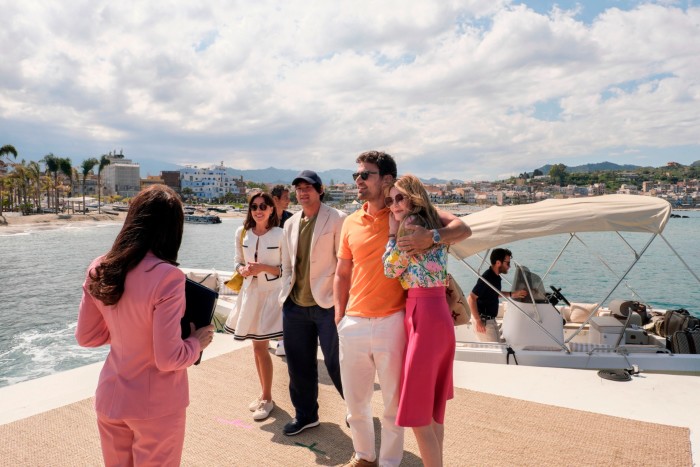[ad_1]

Wealth, or the lack of it, is never out of the news. Especially in an economic downturn when everyone feels threatened, there’s always a lot of rich-bashing about: one UK newspaper railed at the UK’s new prime minister Rishi Sunak for being “richer than the king”.
I’m recovering from the excesses of the art market over past weeks — a magnificent, if overcrowded, edition of Frieze London, with its elegant sister Frieze Masters, followed by an assured newcomer in Art Basel’s Paris+ fair. No one can spend long in these halls of cultural luxury without thinking about money, who has it and how, and the gulf between the very rich and the rest is never more glaring than when watching the apparent ease with which millions change hands in buying art.
It does strange things to your head, I find. Not long ago at an auction viewing, gazing at a valuable work of art up for sale, the image of a street suddenly swam into my head. It’s an ordinary east London street of two-bedroom terraced houses where my godson bought his first house not long ago. I realised that the square metre or two of canvas in front of me could “buy” the entire street, all 80 or so houses, and all the lives contained in them. Houses whose occupants are now terrified that the current rises in mortgage rates will force them out of these homes. Love art though I do, I can’t help feeling that picture really has a lot to prove.
At a moment when all but the richest feel financially wobbly, a distrust of uber-wealth can become an obsession. So, the second series of The White Lotus, whose first, set in the eponymous hotel in Hawaii, openly mocks a picaresque parade of egregiously moneyed characters, is well timed. We see the staff plaster on fake smiles for their rich and whimsical guests, whose self-absorption and pigheadedness are by turns horrifying, hilarious, nauseating and — yes — sometimes rather touching.
Yet through the course of a week’s stay, every one of the guests is somehow changed by their experiences at the hotel; there are dramatic revelations, changes of direction and of heart, glimmers of self-awareness. But writer-director Mike White’s comedic satire has sharp teeth: the losers in this game of the rich at play are, inevitably, the staff, the servants, the islanders.
In the first series, a lonely, bored woman offers a deferential masseuse lavish backing for her business dream and, just as whimsically, withdraws it. A young guest lures her Hawaiian lover into a jewel theft: you can guess how well that turns out. The manager, goaded beyond endurance by a particularly odious frat-boy guest, lands up with a knife in his guts. The wealthy, says this series, leave havoc in their wake and take the flight home.
The new series is set on a different island, Sicily. The settings look more lavish than ever: besides ultra-luxury and spectacular scenery there will be Vespas, pasta, ruins. And a whole new cast, with the exception of the middle-aged Tanya McQuoid (brilliantly played by Jennifer Coolidge), a wobbling, trout-lipped mess of neuroses, adipose tissue and self-obsession, a caricature subplot in series one now brought to the fore. Expect more rich guests, more horrible behaviour, chaos and heartbreak, and perhaps a little bit of comeuppance on the Italian island.
Another new film that takes aim at the wealthy and pretentious, Triangle of Sadness, assembles its wide cast on a luxury cruise: oligarchs, arms dealers, fashionistas, the odd genuine toff. Director Ruben Östlund’s comedy-satire explores wealth in all its forms, including beauty as a form of currency and a means of social movement; the social media currency of influencers. A drink-sozzled Marxist captain marshals crew, servants and skivvies in a rigid onboard hierarchy. But when the boat sinks and they all end up stranded on a remote island, social differences as well as barriers of wealth and education are upended, with a cleaning woman emerging as the competent, natural leader.

Writers of fiction have found remote islands useful for exploring issues of race, class, money and people’s fundamental strength of character — right back to Robinson Crusoe and Mutiny on the Bounty. In the US in the 1960s, a shipwreck story TV series called Gilligan’s Island ran for 98 episodes. And the basic plot of Triangle of Sadness closely echoes that of a 1957 film The Admirable Crichton, with Kenneth More as the eponymous butler who rises to preside as undisputed autocrat over the desert island on which he and his aristocratic former employers are wrecked.
Given its era, Crichton’s thrust was more about class than money. The running joke is that Crichton is in fact a terrific snob, devoted to the niceties of social order. When asked (in pre-island days) by one of the grand family he serves whether he yearns for universal social equality, he replies: “Any satisfaction I might derive from being your equal, m’lady, would be ruined by the footman being equal to me.”
The desert island, then, is no egalitarian paradise: it works with ruthless Darwinian logic. A fantasy place in which the natural superiority we all feel we possess will shine through. And where the wealthy will no longer be rich, in all the ways that matter.
Jan Dalley is the FT’s arts editor
Find out about our latest stories first — follow @ftweekend on Twitter
[ad_2]
Source link

